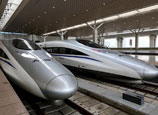
Pick carefully
As Beijing's new leadership settles in, the stock market's fundamentals are back in focus and they could make the recent enthusiasm seem premature, said Simon Grose-Hodge, head of investment advisory for South Asia at private bank LGT.
For one, there is unlikely to be a repeat of anything remotely like the 4 trillion yuan ($640 billion) stimulus package that guided the Chinese economy through the 2008/09 global financial crisis.
Instead, there may be smaller, more targeted spending plans that don't make cheap credit available across the board.
And longstanding issues for investors, such as transparency, reform of state-backed companies, corporate governance and regulator interference in the market, have yet to be properly addressed despite some positive noises from authorities.
So while the H-shares in Hong Kong are showing signs of life, China's domestic stock markets are languishing near three-year lows and on the nose with retail investors.
Two-thirds of Chinese companies that have posted third-quarter earnings missed expectations, according to Citi Private Bank. Profits fell an annual 5.8 percent, and analysts, on average, are still cutting earnings expectations for next year.
Leverage has soared above comfortable levels, with Beijing-based consultancy GaveKal-Draganomics expecting corporate debt to hit 122 percent of GDP by the end of the year, up from 108 percent at end-2011.
Rising non-performing loans pose a risk for the banks, a hangover from cheap credit as part of the 2008/09 stimulus. Goldman Sachs & Co estimates the NPL ratio is more than six times the official reported rate of 0.97 percent.
















 Job interview for airline stewards
Job interview for airline stewards


![]()
